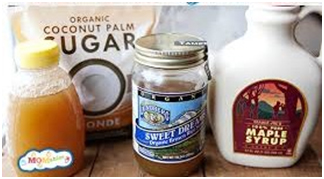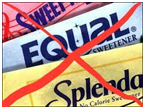In our last post, Shaking the Sugar Craving – A Practical Approach, we talked about the health dangers of simple sugars.
This week, we’ll look at the options for replacing these harmful sugars with healthier alternatives.

Sugar’s drawbacks are well known. But not so obvious is which alternative sweeteners are best, or at least less harmful. Let’s run through the list of sugar replacements.
Raw organic local honey contains vitamins, minerals, enzymes, phytonutrients, propolis, and pollen – all excellent ingredients for a healthy sweetener.
Manuka honey in particular is alkalinizing – and the body’s immune system functions best in a slightly alkaline environment. Manuka’s other unusual virtues include reducing allergic reactivity and fighting infection. The unique manuka factor (UMF) rates at least a 10 for its antibiotic effect. Be aware, however, that even though honey is among the healthier substitute sweeteners, it’s IS still sugar, and over-consumption of any sugar, whether or not they come with a “healthy” rep, isn’t conducive to optimal health.
Pure organic maple syrup has a glycemic index of 54, which means it affects the body’s blood-sugar balance to a lesser degree than either honey or sugar. Like honey, it’s replete with minerals.
The lighter maple syrup grades contain more sucrose (white sugar), while the darker grades contain primarily fructose and glucose, similar to honey and molasses. (Molasses is simply sugar boiled down to a syrup.)
 Coconut sugar has a high proportion of sucrose, as well as a prebiotic, inulin, plus a variety of nutrients and antioxidants. Inulin is a fiber that has been linked to several health benefits. Your gut bacteria convert inulin and other prebiotics into short-chain fatty acids that nourish the colon cells and provide various other health benefits.
Coconut sugar has a high proportion of sucrose, as well as a prebiotic, inulin, plus a variety of nutrients and antioxidants. Inulin is a fiber that has been linked to several health benefits. Your gut bacteria convert inulin and other prebiotics into short-chain fatty acids that nourish the colon cells and provide various other health benefits.
In conditions such as Small Intestinal Bacterial Overgrowth (SIBO), monosaccharides such as in the light maple syrups are a better option as a sugar substitute than any of the di- or polysaccharides.
Agave has been promoted as being healthier than any of the above-listed sugars. But, in reality, agave syrup has a higher ratio of fructose to glucose (90% to 10%) than even high-fructose corn syrup (55%).
Why is that bad? Fructose contributes to diabetes by reducing the sensitivity of the body’s insulin receptors. Fructose also increases uric acid and lactic acid, causes oxidative damage, and promotes the loss of minerals. Dr. Mercola recommends consuming less than 25 grams of fructose daily from all sources, including fruit and fruit juices.
The sugar alcohols xylitol, malitol, and sorbitol occur naturally in plants and raise blood sugar less than sucrose/white sugar.
Xylitol is antimicrobial and is useful for helping prevent tooth decay, and for treating sinusitis. Unfortunately, excessive use of sugar alcohols can cause digestive distress.
Eryithritol is a calorie-free sugar alcohol that is digested in the small intestine instead of the large intestine. Less sweet than some folks may desire, it’s often mixed with artificial sweeteners.
Non-GMO erythritol is sometimes combined with the naturally sweet fruit lo han guo to make Lakanto. Lakanto is well-tolerated and is probably the best choice (least unhealthy) sugar alcohol product for general consumption.
Truvia, a product that combines erythritol with stevia, is derived from the sweet stevia leaves, but not the whole leaf. Stevia and lo han guo are whole-leaf extracts, and are good sugar-substitute choices.
 Last to consider are the artificial sweeteners aspartame (as in NutraSweet and Equal), sucralose (Splenda), saccharin (Sweet’N Low and others), which ARE UNIVERSALLY A BAD CHOICE.
Last to consider are the artificial sweeteners aspartame (as in NutraSweet and Equal), sucralose (Splenda), saccharin (Sweet’N Low and others), which ARE UNIVERSALLY A BAD CHOICE.
Sweet and non-caloric they certainly are, but they are also very far from “healthy.”
An abundance of well-researched evidence tells us that aspartame in particular is neurotoxic, disrupts insulin levels, impairs kidney function, stimulates fat storage and weight gain (!!!), and creates numerous other unwelcome side-effects. For the full scoop on these extremely ill-advised sugar replacements, we recommend Dr. Mercola’s book Sweet Deception.
When all is said and done, it’s best to keep a tight rein on your sweet tooth, and use the replacement sweeteners of your choice in moderation.
****
Find out more about Dr. Connie’s work HERE.
